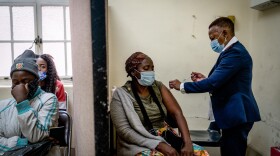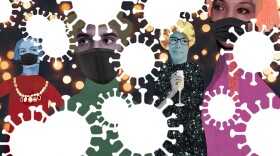
Michaeleen Doucleff
Michaeleen Doucleff, PhD, is a correspondent for NPR's Science Desk. For nearly a decade, she has been reporting for the radio and the web for NPR's global health outlet, . Doucleff focuses on disease outbreaks, cross-cultural parenting, and women and children's health.
In 2014, Doucleff was part of the team that earned a George Foster Peabody award for its coverage of the Ebola outbreak in West Africa. For the series, Doucleff reported on how the epidemic ravaged maternal health and how the virus spreads through the air. In 2019, Doucleff and Senior Producer Jane Greenhalgh produced a story about how Inuit parents teach children to control their anger. That story was the one on NPR.org for the year; altogether readers have spent more than 16 years worth of time reading it.
In 2021, Doucleff published a book, called Hunt, Gather, Parent, stemming from her reporting at NPR. That book became a New York Times bestseller.
Before coming to NPR in 2012, Doucleff was an editor at the journal Cell, where she wrote about the science behind pop culture. Doucleff has a bachelor degree in biology from Caltech, a doctorate in physical chemistry from the University of Berkeley, California, and a master's degree in viticulture and enology from the University of California, Davis.
-
In many cultures around the world, parents don't need chore charts or allowances for kids to pitch in around the house. A new study shows how parents in these cultures teach children to be helpful.
-
Vaccines still do a solid job at warding off hospitalization from omicron. So if you're young and healthy, why get a booster? Scientists explain how boosters help and the best timing to get one.
-
Scientists know the omicron variant will cause many breakthrough infections. Given that omicron is now the dominant strain in the U.S., maybe it's time to rethink that booster shot.
-
Researchers in South Africa have found that people infected with omicron, on average, are less likely to end up in the hospital. But the variant may act differently here in the U.S.
-
A new study from the University of Hong Kong offers preliminary information that could explain why this new coronavirus variant may be more transmissible.
-
Data from 78,000 South Africans with COVID show the Pfizer vaccine is far less effective in preventing infection by the omicron variant. But there is still significant protection from severe illness.
-
Scientists in South Africa have found that the effectiveness of the Pfizer vaccine to prevent SARS-CoV-2 infections has dropped to about 30% for the omicron variant.
-
In small studies in South Africa and in Germany, the results indicate a marked decrease in the ability of vaccines to neutralize this variant. But there are other findings that are encouraging.
-
Preliminary data out of South Africa suggest COVID vaccines are much less effective at stopping infection from the omicron variant, but there's hope the vaccines will protect against severe disease.
-
You might want to cancel that holiday party, and definitely dust off your face mask. Don't panic, but do step up your precautions. Here's how.





